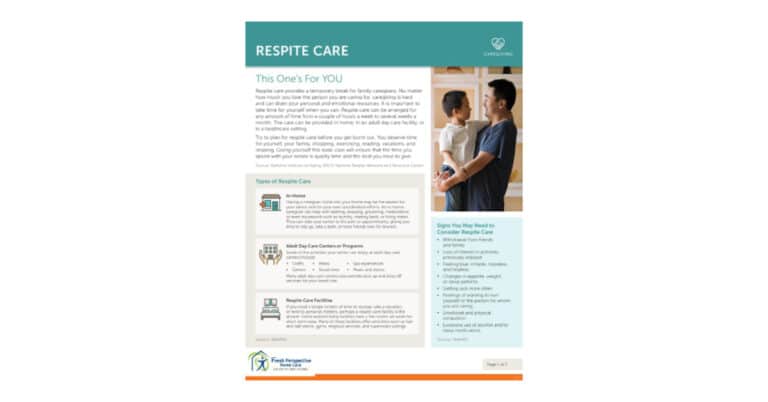Source: National Institute on Aging, ARCH National Respite Network and Resource Center
Types of Respite Care

In-Home
Having a caregiver come into your home may be the easiest for your senior and for your own coordination efforts. An in-home caregiver can help with bathing, dressing, grooming, medications or even housework such as laundry, making beds, or fixing meals. They can take your senior to the park or appointments, giving you
time to tidy up, take a bath, or have friends over for brunch.
Adult Day Care Centers or Programs
Some of the activities your senior can enjoy at adult day care centers include:
• Crafts • Meals • Spa experiences • Games • Social time • Music and dance
Many adult day care centers also provide pick up and drop off services for your loved one.
Respite Care Facilities
If you need a longer stretch of time to recoup, take a vacation, or tend to personal matters, perhaps a respite care facility is the answer. Some assisted living facilities have a few rooms set aside for short-term stays. Many of these facilities offer amenities such as hair and nail salons, gyms, religious services, and supervised outings.
Source: WebMD
Signs You May Need to Consider Respite Care
• Withdrawal from friends and family
• Loss of interest in activities previously enjoyed
• Feeling blue, irritable, hopeless, and helpless
• Changes in appetite, weight, or sleep patterns
• Getting sick more often
• Feelings of wanting to hurt yourself or the person for whom you are caring
• Emotional and physical exhaustion
• Excessive use of alcohol and/or sleep medications
Source: WebMD
The Right Time
Needing help does not make you a failure. It shows that you are human. It also means that you are thinking ahead and practicing self-care.
Also, if you haven’t set up reliable alternate care, you may not be ready if an emergency arises that necessitates you being away from your loved one. You don’t want to be testing out new arrangements in the middle of a crisis or illness.
Sometimes the best way to get acceptance for an alternate caregiver is to have someone help with housework before helping with personal care. This allows your loved one to become familiar with the idea of a new caregiver and build trust. It may also buy you that same time. It can also be helpful to suggest that you would like to try having a person in “just for a week,” which gives your senior some feeling of control over the situation and might help them be more open to extending the arrangement. Make sure to include extended family in the decision. They may not realize how difficult it is for you to be a caregiver and may help with solutions or even step up to be your respite caregiver. They won’t know you need help if you don’t tell them. Do not discount the desire of friends and neighbors to help. You likely have a network of friends outside of immediate family who would be happy to give you a break. They can provide a perfect social diversion or an understanding ear and may be more accepted by your loved one for delicate personal needs.
Source: Family Caregiver Alliance
Ideas for Involving Family
Local family and friends can:
• Prepare meals
• Pick up prescriptions
• Spend a few hours a week at the house
• Take your loved one to adult day care
• Accompany your senior on a trip to the park or museum
Remote family and friends can:
• Fund a meal service
• Check in with your senior on phone or video calls
• Help with car service schedules
• Come out for a week so you can decompress on a vacation or staycation
Source: AARP
- How To Help Your Senior Parent Reduce Stress - March 26, 2025
- Celebrating March Birthdays, Anniversaries and New Team Members! - March 11, 2025
- MARCH HIGH FIVE! - March 11, 2025



